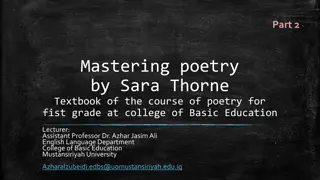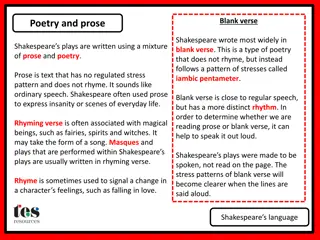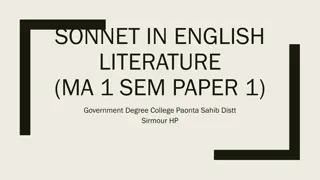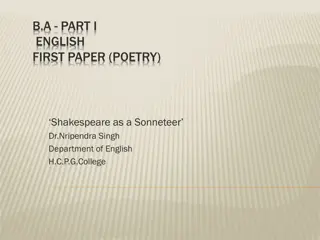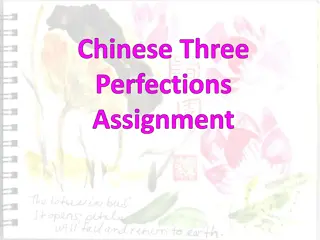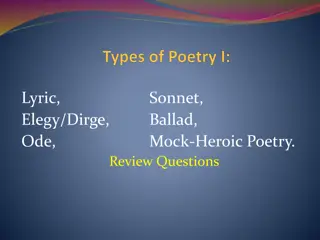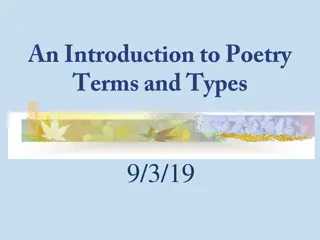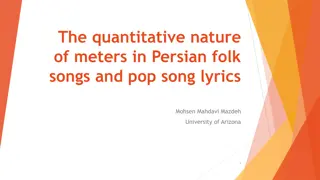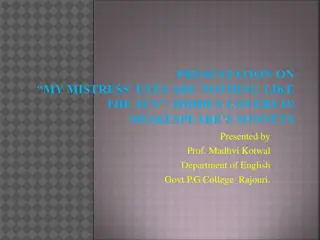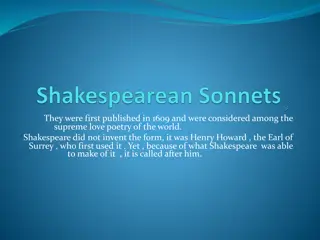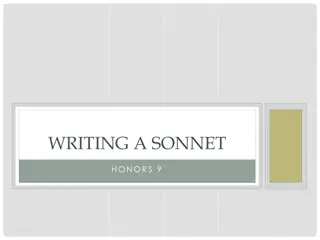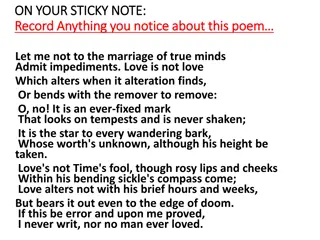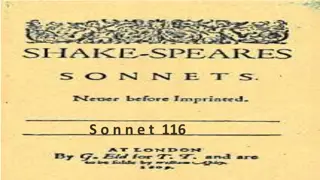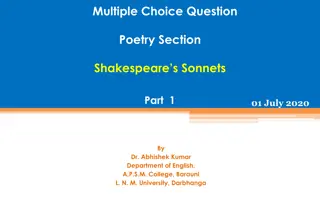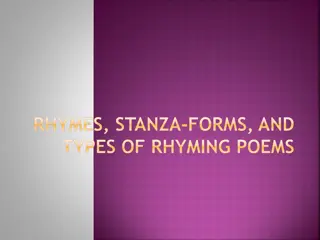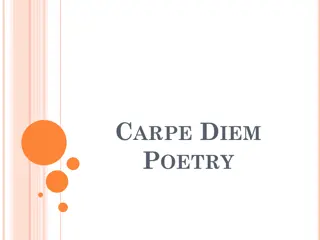Introduction to Sonnets and Haikus in Poetry
Explore the beauty of sonnets and haikus in poetry with a step-by-step guide on how to differentiate and analyze them. Dive into the world of creative expression with examples from renowned poets like Basho and William Shakespeare, learning objectives, and artistic imagery.
Download Presentation

Please find below an Image/Link to download the presentation.
The content on the website is provided AS IS for your information and personal use only. It may not be sold, licensed, or shared on other websites without obtaining consent from the author. Download presentation by click this link. If you encounter any issues during the download, it is possible that the publisher has removed the file from their server.
E N D
Presentation Transcript
-HOW TO PLAY- There are 6 groups Each member group must have 3 main words (season and things) Write the main words in the board Other group will make 3 sentences ( 5-7-5 syllables) using the main words in the piece of paper After it is done, read it to everyone Choose the best haiku by voting H A I K U H A I K U Spring morning marvel Lovely nameless little hill On a sea of mist - Basho
SONNET & MONOLOGUE POEM BY : NI PUTU AYU PUSPA YULIANDARI
LEARNING OBJECTIVES LEARNING OBJECTIVES Students are able to differentiate sonnet and dramatic monologue poem based on the features. Students are able to analyze the characteristics of sonnet and dramatic monologue poem properly.
SONNET MONOLOGUE POEM MONOLOGUE POEM SONNET
SONNET SONNET One type of poems which has features: 14 lines broken down into 4 sections called quatrains A strict rhyme scheme Written in iambic pentameter
William Shakespeare William Shakespeare (26 April 1564 23 April 1616) Poet Playwright Actor
ESSENTIAL ENGLISH PP 243 SONNET XVIII
Sonnet 18: Shall I compare thee to a Sonnet 18: Shall I compare thee to a Summers day? Summers day? Shall I compare thee to a Summers day? But thy eternal Sommer shall not fade, Thou art more lovely and more temperate: Nor loose possession of that faire thou Rough winds do shake the darling buds of ow st, May, Nor shall death brag thou wandre st in his And Sommers lease hath all too short a date: shade, Sometime too hot the eye of heaven shines, When in eternal lines to time thou grow st, And often is his gold complexion dimm d, So long as men can breath or eyes can And every faire from faire some-time declines, see, By chance, or natures changing course So long lives this, and this gives life to untrimm d: thee,
Sonnet 18: Shall I compare thee to a Sonnet 18: Shall I compare thee to a Summers day? Summers day? Shall I compare thee to a Summers day? But thy eternal Sommer shall not fade, Thou art more lovely and more temperate: Nor loose possession of that faire thou Rough winds do shake the darling buds of ow st, May, Nor shall death brag thou wandre st in his And Sommers lease hath all too short a date: shade, Sometime too hot the eye of heaven shines, When in eternal lines to time thou grow st, And often is his gold complexion dimm d, So long as men can breath or eyes can And every faire from faire some-time declines, see, By chance, or natures changing course So long lives this, and this gives life to untrimm d: thee,
Sonnet 18: Shall I compare thee to a Summers day? Sonnet 18: Shall I compare thee to a Summers day? Shall I compare thee to a Summers day? 1st quatrain : 4Rhyme ABAB States the subject of sonnet Thou art more lovely and more temperate: Rough winds do shake the darling buds of May, And Sommers lease hath all too short a date: Sometime too hot the eye of heaven shines, 2nd quatrain : 4Rhyme CDCD Develops the sonnet s theme And often is his gold complexion dimm d, And every faire from faire some-time declines, By chance, or natures changing course untrimm d: But thy eternal Sommer shall not fade, 3rd quatrain : 4Rhyme EFEF rounds off the sonnet s theme Nor loose possession of that faire thou ow st, Nor shall death brag thou wandre st in his shade, When in eternal lines to time thou grow st, 4th quatrain : 4Rhyme GG serves as a conclusion to the sonnet So long as men can breath or eyes can see, So long lives this, and this gives life to thee,
M O N O L O G U E P O E M
FORM OF DRAMATIC POETRY FORM OF DRAMATIC POETRY Soliloquy Speaks to himself/herself and shows his/her ideas Dramatic Monologue Talks to someone else in the play even the second character does not say anything. It makes the dialogue more believable. Character Sketch Creates emotional connection to the audience
MONOLOGUE POEM MONOLOGUE POEM Narrates a story Emotions or behavior A set rhyming or meter pattern Typically ends up feeling very rhythmic The speech and actions to depict a scene or plot The point of view of the character Action through Facial expression, gestures, or interaction with other people or things Acting by physical performance, spoken, or sung
ESSENTIAL ENGLISH PP 243-245 LAST DUCHESS
ESSENTIAL ENGLISH PP 250 MARY MAGDALENE





